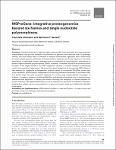MSProGene: integrative proteogenomics beyond six-frames and single nucleotide polymorphisms
Zickmann, Franziska
Renard, Bernhard Y.
Ongoing advances in high-throughput technologies have facilitated accurate proteomic measurements and provide a wealth of information on genomic and transcript level. In proteogenomics, this multi-omics data is combined to analyze unannotated organisms and to allow more accurate sample-specific predictions. Existing analysis methods still mainly depend on six-frame translations or reference protein databases that are extended by transcriptomic information or known single nucleotide polymorphisms (SNPs). However, six-frames introduce an artificial sixfold increase of the target database and SNP integration requires a suitable database summarizing results from previous experiments. We overcome these limitations by introducing MSProGene, a new method for integrative proteogenomic analysis based on customized RNA-Seq driven transcript databases. MSProGene is independent from existing reference databases or annotated SNPs and avoids large six-frame translated databases by constructing sample-specific transcripts. In addition, it creates a network combining RNA-Seq and peptide information that is optimized by a maximum-flow algorithm. It thereby also allows resolving the ambiguity of shared peptides for protein inference. We applied MSProGene on three datasets and show that it facilitates a database-independent reliable yet accurate prediction on gene and protein level and additionally identifies novel genes.
Dateien zu dieser Publikation
Keine Lizenzangabe

